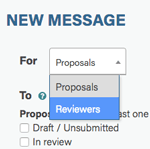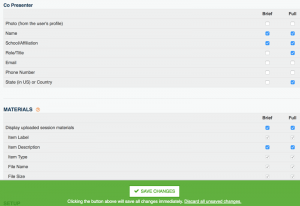 Call admins can now email reviewers using the Messaging Module!
Call admins can now email reviewers using the Messaging Module!
Facebook Algorithm Change Can Benefit Associations
This week, Facebook changed their algorithm for users’ News Feeds, making it more difficult for “fake news” and click-bait links to gain traction on the social-media platform. According to an article on TechCrunch, Facebook will now detect and downrank links and headlines that include any of the following:
- Exaggerative & sensational headlines
- Headlines that withhold information
- Misleading content
One key element of the change is that Facebook will no longer rely on the source of the offending content, instead evaluating each post individually. The update will be available to identify “fake news” in the top 10 languages that Facebook accounts use.
So what does this mean for your association? Continue reading Facebook Algorithm Change Can Benefit Associations
Something’s Different…
Some of you may have noticed a different look to our public pages (and slight changes to some of the pages on the back end of the site). That’s because we’ve had work
New Feature: Activity Reports
If you’re a call admin, the next time you sign in you’ll see a couple of changes we’ve made to the Administrators page for your call.
Session Titles That Shine
An abstract’s title, description, and learning objectives are the core of every presenter’s “sales pitch” to both reviewers and attendees. However, very few presenters have an understanding of how to sell their presentation using even the most basic marketing techniques. Perhaps as a result, 95% of meeting organizers report having to rewrite speakers’ submissions1.
Continue reading Session Titles That Shine
Save-Changes Changes
 We’re rolling out a few improvements to the way call settings are saved.
We’re rolling out a few improvements to the way call settings are saved.
Continue reading Save-Changes Changes
Session Materials
Our Publishing Module now includes an option to include/exclude session materials.
Reviewer Conflicts of Interest
We’ve made a few changes to make it easier for reviewers, review chairs, and call admins to identify conflicts of interest.
Although conflicts are not very common (accounting for about 0.1% of reviews in ProposalSpace), we understand that it’s critical for reviewers to be able to flag them clearly as conflicts and for call admins and review chairs to be able to identify them easily.
Invitations
Here’s a quick tip for call admins when adding an admin, review chair, or reviewer:
Use a complete email address (e.g. “harry.potter@hogwarts.edu”) to search for the user’s account. That way, the user will be added immediately and won’t have to confirm the action.
If instead you search using all or part of a user’s name (e.g. “Potter”) or a partial email address (e.g. “harry.potter”), the user will have to confirm the action before actually being added.
In case you’re wondering, we added this step to strengthen privacy on the site. We figure if you don’t know someone’s full email address, we shouldn’t display it to you until they say it’s OK to do so. If, however, you already know someone’s full email address, there’s really no reason to require an additional step. In that case, we just send them an email letting them know they’ve been added.
Snapchat Pro Tips
Snapchat has changed the way we think about video content on social media but has been challenging for many associations to understand and use for their audiences, while also being worth their time, energy, and resources invested into the app. Even still, it’s an important platform for associations to utilize as more people use Snapchat than Twitter, in terms of daily use. Disappearing content and unedited video are extremely popular with millennials, and Facebook, the most popular social media platform, predicts video content is the future of online engagement.
Here are the best practices we’ve found to work for associations:
Continue reading Snapchat Pro Tips

